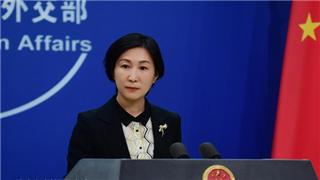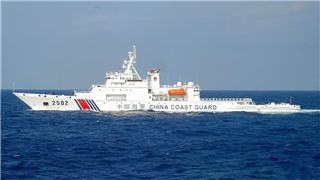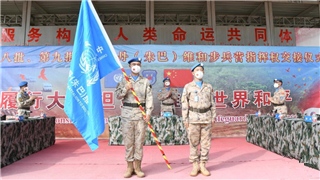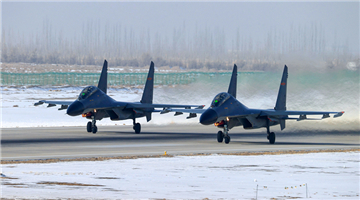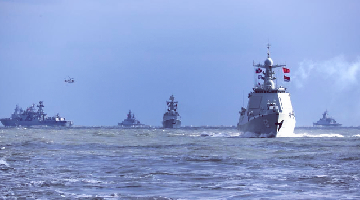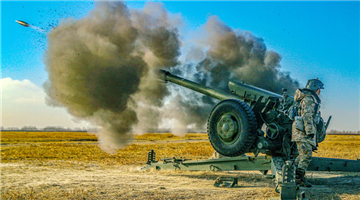By Gao Qiao
高乔
US President JoeBiden signed on December 23 the National Defense Authorization Act for Fiscal Year 2023 (NDAA FY2023) into law, whose total volume of US$857.9 billion topped the previous year by US$80 billion.
美国总统拜登12月23日正式签署了价值8579亿美元的2023财年国防授权法案。较前一财年的授权额度增加800亿美元,该法案在拜登签署后正式成为法律。
Li Zheng, associate researcher at the Institute of American Studies, China Institutes of Contemporary International Relations (CICIR), attributed the continuous rise of America’s defense budget to several factors. One, the mounting inflation in the US is the direct reason. Two, the US Congress takes military spending as a key driver to pump up local economic recovery and boost employment, and the annual defense budget has become an important source of funding for local areas. Three, the US is facing pressure in external outlay as the assistance to Ukraine, the anti-terror war and the Pacific Deterrence Initiative in the Asia Pacific have notably increased its overall military spending.
对于美国国防预算不断攀升的原因,中国现代国际关系研究院美国研究所副研究员李峥认为受几方面因素的综合影响。其一,美国目前高涨的通胀水平是直接原因。其二,美国国会将军费开支作为促进地方经济恢复、提升就业的重要动力,每年国防预算已成为地方获得拨款的重要来源。其三,美国面临外部支出的“硬性压力”,对乌克兰援助、反恐战争及亚太地区“太平洋威慑倡议”等“多线作战”显著增加美国整体军费支出。
The Republic and Democratic parties have never been so united on the security domain about the necessity to maintain America's global hegemony, analyzed Teng Jianqun, a researcher at the China Institute of International Studies. The NDAA shows that American political elites intend to keep up their global leadership in the next 10 to 20 years, focusing their security strategy and foreign policies on the Asia Pacific for the so-called major country competition. Business groups in the country, on the other hand, set their eyes more on immediate interests, hoping to make more hay out of the geopolitical tension in Europe. That explains the parallel arrangements in the NDAA for the two regions.
中国国际问题研究院研究员滕建群分析认为,当前,美国两党在安全领域达成空前一致,即必须维护美国全球霸权地位。从国防授权法案可以看出,美国政治精英着眼于在未来10到20年维护美国全球领导地位,希望将安全战略、对外政策聚焦亚太地区,展开所谓“大国竞争”。而美国商业利益集团则更多着眼于眼前利益,希望抓牢在欧洲的商业利润,不断从欧洲地缘政治紧张局势中谋取利益。因此,美国在国防预算中作出了亚太地区和欧洲地区“两线作战”的安排。
Teng also pointed out the four features in America’s military buildup as reflected by the NDAA FY23. The first is that terms like “challenge” and “threat” have become a bipartisan consensus and a key reason to ask for more fiscal appropriation. The US has kept hyping up the so-called “major country threats” in the security domain and using that as an excuse to split taxpayers’ money among military complexes and other interest groups. In fact, only by continuously exacerbating the tension and political fear and demonizing the rivals can the military complexes find an excuse to justify the whopping military spending. The second is that the rising defense budget is closely linked to the “major country strategic competition” put forth by the US government. The NDAA proposed to invest at least US$11 billion in the Pacific Deterrence Initiative and deploy offensive/defensive missile systems in Alaska, ROK, Japan, China's Taiwan and the Philippines, with the purpose of winning the so-called “major country competition”against China. The third is that the US has come to a period to upgrade its weapons and equipment. Upgrading the “triad” nuclear strike forces, other conventional weapons and modern military equipment require an enormous amount of money.The fourth is that with the extensive application and rapid progress of information technology, the US has to invest more in high and new military technologies in order to maintain its global domination in the area.
同时,他也指出2023财年《国防授权法案》所反映出的美国军事建设四大特点。其一,应对所谓“挑战”“威胁”已成为两党共识,也成为增加财政拨款的重要驱动力。美国不断在安全领域渲染所谓“大国威胁”,旨在以此为由,名正言顺地把钱从纳税人口袋里拿出来,分给军工复合体等利益集团。而且也只有不断加剧紧张局势和政治恐惧以及妖魔化对手,军工复合体才能为巨额军费开支辩护。其二,美国国防预算增加,与美国政府提出的“大国战略竞争”关系密切。如法案提出,投入至少110亿美元用于“太平洋威慑计划”,在阿拉斯加、韩国、日本、中国台湾、菲律宾一线部署攻防兼备导弹体系,目的就是与中国开展所谓“大国竞争”。其三,美军进入武器装备叠代期,包括升级“三位一体”核打击力量和其他常规武器装备,更新现代化军事装备需要大量资金支持。其四,随着信息技术的广泛应用和快速迭代,美国为维持军事技术领先全球的霸权地位,加大在军事高新技术领域投入。
Even America’s peak military spending during the Cold War is dwarfed by what it is spending today, when politicians are more concerned about whether the Pentagon has enough to squander than whether the general public has decentlife, which is a very dangerous tendency. The call for more military expenditure is primarily driven by the “unprecedented threats” from China, but stressing China as an “extreme military threat” cannot be a more wrong description of the essence of Sino-US competition, and it largely exaggerates China’s current military strengths and the possibility of it taking any military action in the future.
即使冷战时期的美国军费顶峰同当下相比,也得相形见绌,政客们更在乎五角大楼钱够不够花,而不在意美国民众日子过得怎么样,这是在走一条非常危险的道路。要求增加军费开支的呼声很大程度上基于所谓中国“前所未有的威胁”,但强调中国是“极端军事威胁”极为错误地描述了美中竞争本质,并严重夸大了中国目前的军事实力和未来采取军事行动的可能性。
In the meantime, Li Zheng said America's growing military input in the Asia Pacific in recent years has tightened its military connections with regional countries, which may gradually strip certain countries of their military initiative and accelerate the degradation of the regional security situation.
与此同时,李峥指出,近年来美国在亚太地区军事投入逐年增加,该地区越来越多国家与美国形成更强的军事联系网络,这可能日渐剥夺部分地区国家在军事领域的主动权,并加快亚太地区安全形势恶化的风险。
Teng Jianqun further pointed out that the military arrangements revealed by the latest NDAA will impose more negative impacts on global security. On the one hand, international cooperation will be further disrupted and America’s beggar-thy-neighbor and clique-forming Cold War mentality will polarize the international community, making it more difficult for countries to stay neutral. On the other hand, while busy muddying the water in the Asia Pacific and aggravating tension across the Taiwan Straits and on the Korean peninsula, the US is at the same time inflaming public discourse at home to increase defense budget. In addition to liningits pocket out of regional turmoil, it is also spurring allies to increase their military budget and instigating a regional arms race, which is a serious hazard for regional peace and stability.
在这个问题上,滕建群认为美国《国防授权法案》透露的军事安排,也将给全球安全局势带来进一步的消极影响。一方面,国际社会合作被进一步撕裂,美国遵循以邻为壑、拉帮结派的冷战思维,使国际社会出现明显两极化倾向,保持中立越发艰难。另一方面,美国一边在亚太地区不断搅局、搞事,激化台湾海峡、朝鲜半岛紧张局势,一边在国内挑动舆论渲染,增加国防预算。美国不仅从地区震荡中谋取私利,还刺激地区盟国提高军费预算、加剧地区军备竞赛态势,对地区和平与稳定带来巨大负面影响。

